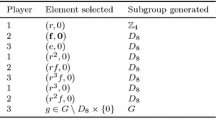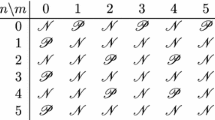Abstract
We study two impartial games introduced by Anderson and Harary and further developed by Barnes. Both games are played by two players who alternately select previously unselected elements of a finite group. The first player who builds a generating set from the jointly selected elements wins the first game. The first player who cannot select an element without building a generating set loses the second game. After the development of some general results, we determine the nim-numbers of these games for abelian and dihedral groups. We also present some conjectures based on computer calculations. Our main computational and theoretical tool is the structure diagram of a game, which is a type of identification digraph of the game digraph that is compatible with the nim-numbers of the positions. Structure diagrams also provide simple yet intuitive visualizations of these games that capture the complexity of the positions.

















Similar content being viewed by others
References
Albert M, Nowakowski R, Wolfe D (2007) Lessons in play: an introduction to combinatorial game theory. AMC 10:12
Anderson M, Harary F (1987) Achievement and avoidance games for generating abelian groups. Int J Game Theory 16(4):321–325
Barnes FW (1988) Some games of F. Harary, based on finite groups. Ars Combin 25(A):21–30 Eleventh British Combinatorial Conference (London, 1987)
Brandenburg M (2017) Algebraic games playing with groups and rings. Int J Game Theory 1–34. https://doi.org/10.1007/s00182-017-0577-7
Dixon JD (1967) Problems in group theory. Blaisdell Publishing Co. Ginn and Co., Waltham, Toronto, London
Dlab V (1960) The Frattini subgroups of abelian groups. Czechoslovak Math J 10(1):
Dummit DS, Foote RM (2004) Abstract algebra, 3rd edn. Wiley, Hoboken
Ernst DC, Sieben N (2013) Companion web site. http://jan.ucc.nau.edu/ns46/GroupGenGame. Accessed 24 Nov 2017
Fraenkel AS, Perl Y (1975) Constructions in combinatorial games with cycles, Infinite and finite sets (Colloq., Keszthely, 1973; dedicated to P. Erdős on his 60th birthday), Vol. II, North-Holland, Amsterdam, pp. 667–699. Colloq. Math. Soc. Janós Bolyai, Vol. 10
Jacobson N (1985) Basic algebra. I, 2nd edn. W. H. Freeman and Company, New York
Rose JS (1994) A course on group theory. Dover Publications Inc, New York
Siegel AN (2013) Combinatorial game theory, graduate studies in mathematics, vol 146. American Mathematical Society, Providence
Smith CAB (1966) Graphs and composite games. J Comb Theory 1:51–81
Suzuki M (1982) Group theory. I. Grundlehren der Mathematischen Wissenschaften. vol. 247, Springer-Verlag, Berlin
The GAP Group (2013) GAP–Groups, algorithms, and programming. Version 4.6.4.
Author information
Authors and Affiliations
Corresponding author
Rights and permissions
About this article
Cite this article
Ernst, D.C., Sieben, N. Impartial achievement and avoidance games for generating finite groups. Int J Game Theory 47, 509–542 (2018). https://doi.org/10.1007/s00182-017-0602-x
Accepted:
Published:
Issue Date:
DOI: https://doi.org/10.1007/s00182-017-0602-x




